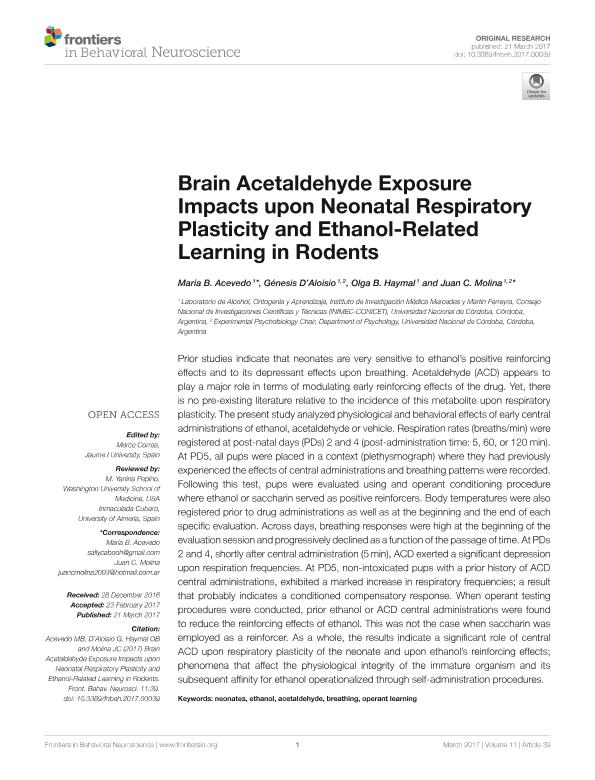Mostrar el registro sencillo del ítem
dc.contributor.author
Acevedo, María Belén

dc.contributor.author
D'aloisio, Génesis

dc.contributor.author
Haymal, Olga Beatriz

dc.contributor.author
Molina, Juan Carlos

dc.date.available
2018-11-08T18:08:57Z
dc.date.issued
2017-03-21
dc.identifier.citation
Acevedo, María Belén; D'aloisio, Génesis; Haymal, Olga Beatriz; Molina, Juan Carlos; Brain acetaldehyde exposure impacts upon neonatal respiratory plasticity and ethanol-related learning in rodents; Frontiers Research Foundation; Frontiers in Behavioral Neuroscience; 11; 39; 21-3-2017; 1-12
dc.identifier.issn
1662-5153
dc.identifier.uri
http://hdl.handle.net/11336/63992
dc.description.abstract
Prior studies indicate that neonates are very sensitive to ethanol’s positive reinforcing effects and to its depressant effects upon breathing. Acetaldehyde (ACD) appears to play a major role in terms of modulating early reinforcing effects of the drug. Yet, there is no pre-existing literature relative to the incidence of this metabolite upon respiratory plasticity. The present study analyzed physiological and behavioral effects of early central administrations of ethanol, acetaldehyde or vehicle. Respiration rates (breaths/min) were registered at post-natal days (PDs) 2 and 4 (post-administration time: 5, 60, or 120 min). At PD5, all pups were placed in a context (plethysmograph) where they had previously experienced the effects of central administrations and breathing patterns were recorded. Following this test, pups were evaluated using and operant conditioning procedure where ethanol or saccharin served as positive reinforcers. Body temperatures were also registered prior to drug administrations as well as at the beginning and the end of each specific evaluation. Across days, breathing responses were high at the beginning of the evaluation session andprogressively declinedas a function of the passage of time. At PDs 2 and 4, shortly after central administration (5min), ACD exerted a significant depression upon respiration frequencies. At PD5, non-intoxicated pups with a prior history of ACD central administrations, exhibited a marked increase in respiratory frequencies; a result that probably indicates a conditioned compensatory response. When operant testing procedures were conducted, prior ethanol or ACD central administrations were found to reduce the reinforcing effects of ethanol. This was not the case when saccharin was employed as a reinforcer. As a whole, the results indicate a significant role of central ACD upon respiratory plasticity of the neonate and upon ethanol’s reinforcing effects; phenomena that affect the physiological integrity of the immature organism and its subsequent affinity for ethanol operationalized through self-administration procedures.
dc.format
application/pdf
dc.language.iso
eng
dc.publisher
Frontiers Research Foundation

dc.rights
info:eu-repo/semantics/openAccess
dc.rights.uri
https://creativecommons.org/licenses/by-nc-sa/2.5/ar/
dc.subject
Acetaldehyde
dc.subject
Breathing
dc.subject
Ethanol
dc.subject
Neonates
dc.subject
Operant Learning
dc.subject.classification
Inmunología

dc.subject.classification
Medicina Básica

dc.subject.classification
CIENCIAS MÉDICAS Y DE LA SALUD

dc.title
Brain acetaldehyde exposure impacts upon neonatal respiratory plasticity and ethanol-related learning in rodents
dc.type
info:eu-repo/semantics/article
dc.type
info:ar-repo/semantics/artículo
dc.type
info:eu-repo/semantics/publishedVersion
dc.date.updated
2018-10-22T15:51:07Z
dc.journal.volume
11
dc.journal.number
39
dc.journal.pagination
1-12
dc.journal.pais
Suiza

dc.journal.ciudad
Lausana
dc.description.fil
Fil: Acevedo, María Belén. Consejo Nacional de Investigaciones Científicas y Técnicas. Centro Científico Tecnológico Conicet - Córdoba. Instituto de Investigación Médica Mercedes y Martín Ferreyra. Universidad Nacional de Córdoba. Instituto de Investigación Médica Mercedes y Martín Ferreyra; Argentina
dc.description.fil
Fil: D'aloisio, Génesis. Consejo Nacional de Investigaciones Científicas y Técnicas. Centro Científico Tecnológico Conicet - Córdoba. Instituto de Investigación Médica Mercedes y Martín Ferreyra. Universidad Nacional de Córdoba. Instituto de Investigación Médica Mercedes y Martín Ferreyra; Argentina
dc.description.fil
Fil: Haymal, Olga Beatriz. Consejo Nacional de Investigaciones Científicas y Técnicas. Centro Científico Tecnológico Conicet - Córdoba. Instituto de Investigación Médica Mercedes y Martín Ferreyra. Universidad Nacional de Córdoba. Instituto de Investigación Médica Mercedes y Martín Ferreyra; Argentina
dc.description.fil
Fil: Molina, Juan Carlos. Consejo Nacional de Investigaciones Científicas y Técnicas. Centro Científico Tecnológico Conicet - Córdoba. Instituto de Investigación Médica Mercedes y Martín Ferreyra. Universidad Nacional de Córdoba. Instituto de Investigación Médica Mercedes y Martín Ferreyra; Argentina
dc.journal.title
Frontiers in Behavioral Neuroscience
dc.relation.alternativeid
info:eu-repo/semantics/altIdentifier/doi/https://dx.doi.org/10.3389/fnbeh.2017.00039
dc.relation.alternativeid
info:eu-repo/semantics/altIdentifier/url/https://www.frontiersin.org/articles/10.3389/fnbeh.2017.00039
Archivos asociados
